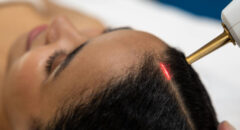
For many, the path to purpose is paved with personal trials. For Taneka Walker, a retired military veteran and board-certified nurse practitioner, the journey to opening her clinic—Walker Wellness and Aesthetics—was born from deeply personal experiences with hair loss, weight struggles, and emotional healing.
While serving in the military, Walker was subjected to tight grooming standards. Years of wearing her hair in buns and under tension led to alopecia—a form of hair loss that is far more than skin deep.
“I would go to the hairstylist and ask, ‘What are you doing?’ And they’d respond, ‘I don’t know.’ I’m not sure if it was because they truly didn’t know or if they just didn’t know how to treat Black women’s hair,” Walker tells BlackDoctor.org.
This experience pushed her to start researching and learning, igniting her passion for helping others facing similar struggles.
“Through everything I’ve learned on this journey, I’m now able to show the women who come to me that you don’t have to spend $500 or $600 on a product,” she shares.
Today, her clinic specializes in hair restoration, weight management, Botox, and DOT exams—a blend of services that reflects both her medical expertise and her personal journey.
“I think one important thing about hair loss and alopecia is that, unlike most issues, it sees no race, no diversity, no color—we’re all affected equally. And it can be traumatizing when your crown isn’t right, or you’re experiencing thinning or hair loss. It’s definitely misunderstood. It’s not just about beauty; it’s about the confidence that it takes away. Hair loss or alopecia can have such a negative and emotional impact that it affects how you show up in the world,” Walker notes.
RELATED: How to Handle the Drastic Changes of Hair Loss
A Safe Space Built on Shared Stories
What sets Walker’s approach apart is her empathy. She doesn’t view her clients as just patients; she sees them as partners in healing.
“It can be hard for women—walking into a boardroom, walking into a room full of colleagues. I know how that feels because it’s affected me, too. I let all my clients know they’re not alone. I’ve been there, I’ve done that. I think the bond we build comes from that shared experience. I’m not just here to collect their money—I’m someone who has actually lived it and gone through it. I like to create what I’d call almost a ‘girlfriend-type’ environment with the women I treat,” Walker shares.
Her collaborative care model emphasizes accountability and connection.
“We are partnering in this—so if I need you to take your vitamins, if I need you to use the shampoo or the hair serum, I’m doing it too. I’m invested because I’ve seen that it works, but we have to do this together,” she says.
As Walker notes, it goes back to the basics—self-care.
“That means asking yourself: how much water are you drinking? Your body and your scalp need to be hydrated. I tell my clients they can even open their vitamins and mix them in if needed. But I also explain why they need those vitamins,” Walker adds.
Healing Beyond the Scalp
One of the main vitamins she focuses on is vitamin D, which she says is just as important as any topical serum or supplement.
“Vitamin D helps stimulate the follicles and also prevents shedding. It’s a very important vitamin for beauty and overall health. But most people think, ‘Oh, I’ll just sit in the sun,’ or ‘I’ll just drink more milk.’ If you’re vitamin D deficient, that’s usually not enough to bring your levels back up,” Walker explains.
Low vitamin D can also make you feel fatigued or down, because it mimics depression and slows serotonin.
“That’s why we need more education and research—and why people just need to be taught how to monitor and maintain their vitamin D levels properly,” she shares.
She recommends starting small and affordably—with daily multivitamins, biotin, and supplements like saw palmetto—reminding women that support doesn’t have to be expensive to be effective.
However, she cautions against social media “miracle” cures.
“If you have follicles, we can stimulate them to regrow hair. But not all treatments are the same. I always encourage people to do their research before choosing anything, especially making sure they’re working with a qualified healthcare professional. Don’t just watch a YouTube video or follow something you saw on social media and think, ‘Oh yeah, I’m going to try that,’ because that can often do more harm than good, she advises.
RELATED: 4 Ways to Get Over Hair Loss Insecurities
Mentorship as Ministry
As a mentor to young women in healthcare and entrepreneurship, Walker is determined to change the culture of “gatekeeping” in the nursing world.
“I want to be an advocate and a change agent. I also want to reach out to my younger nurse practitioner sisters in nursing. In our field, there’s this saying: ‘We eat our young’—meaning we don’t always reach back to support or teach the next generation. I believe in each one, teach one. I show you how to do it, I teach you how to do it, and then you go do it,” she says.
Her passion for mentorship reflects the wisdom she gained from her military training and the guidance she received from the few mentors who embraced her.
“When I was starting out, I didn’t have many elder nurses who were willing to take me under their wing and mentor me. And that kind of support is so important. We cannot allow our younger women to believe they’re alone or that they don’t have anyone to guide them,” Walker adds.
A Message of Empowerment
In honor of International Women with Alopecia Awareness Month, Walker offers words of encouragement to those navigating a new diagnosis:
“What God has for you is for you, and no one can take that away. When you pour out, God will pour back in. A closed hand can’t give, but it also can’t receive. Sometimes we just need to be reminded that we’re not alone—that there is help, that there are treatments, and that there are affordable things you can do for yourself,” she concludes.
Her clinic offers free consultations for anyone seeking guidance, and her website features educational blogs and resources for those starting their journey.









